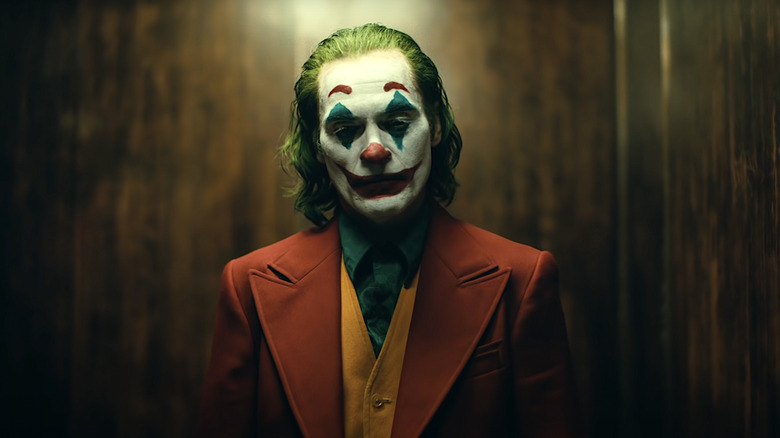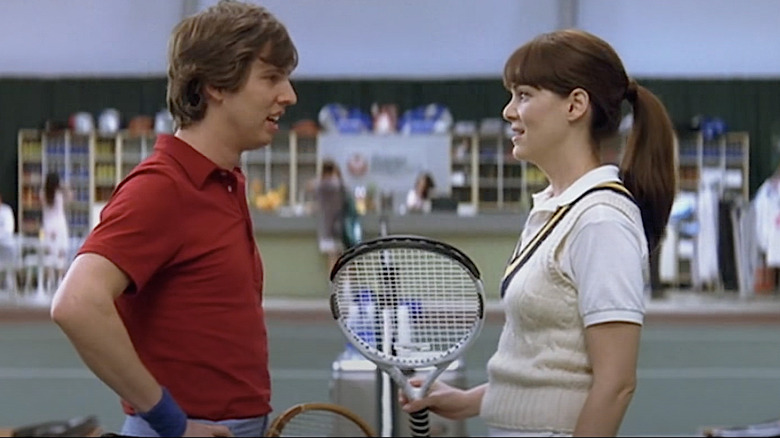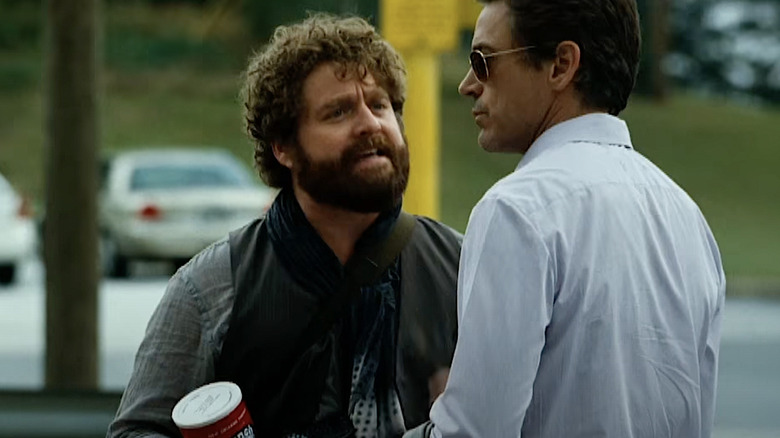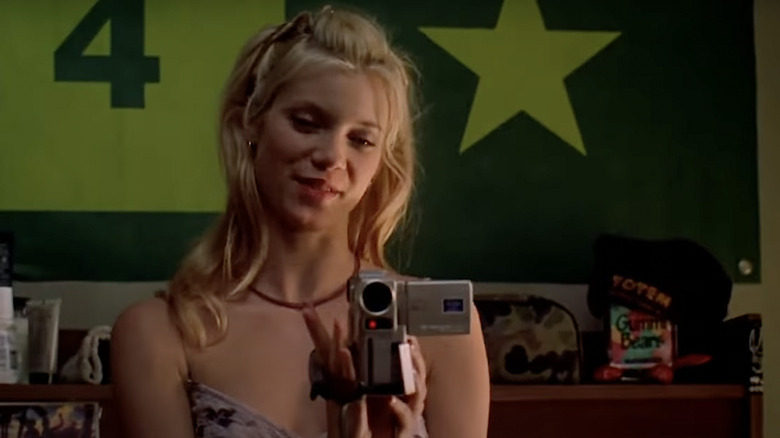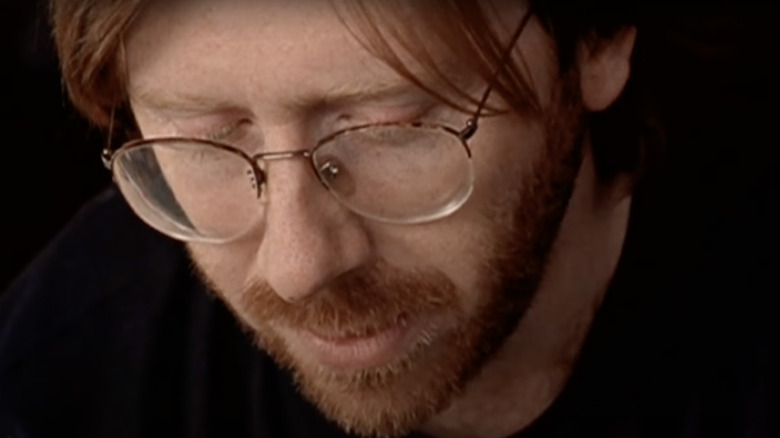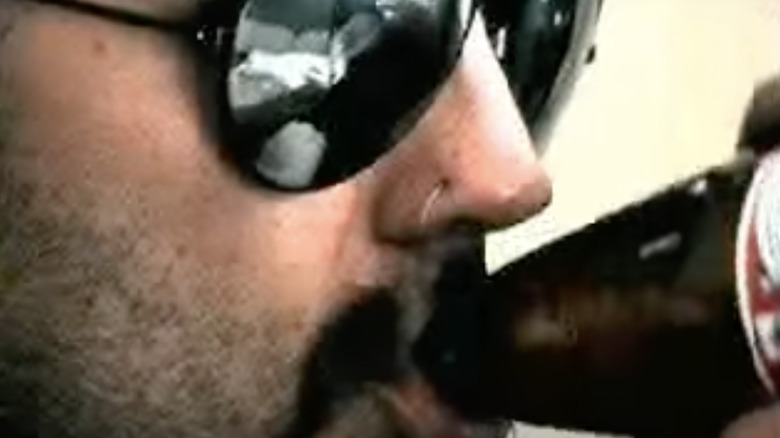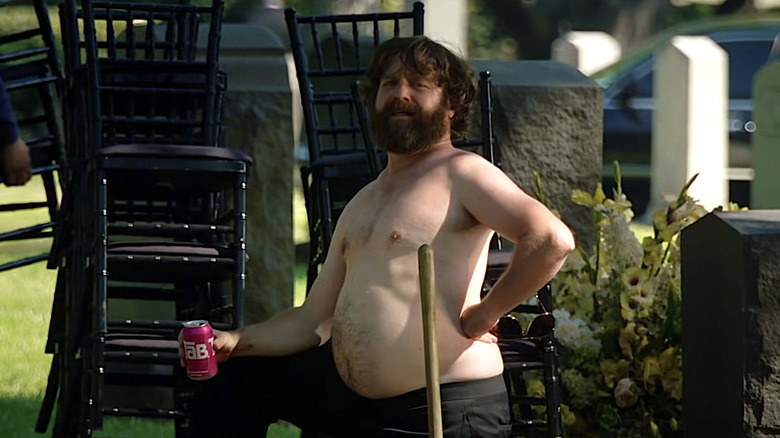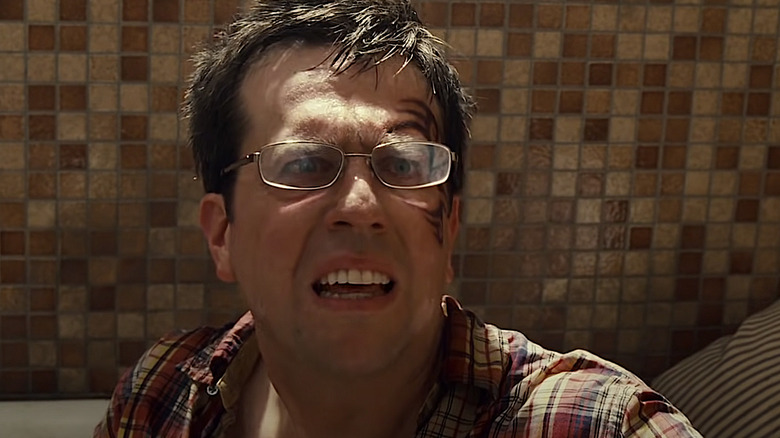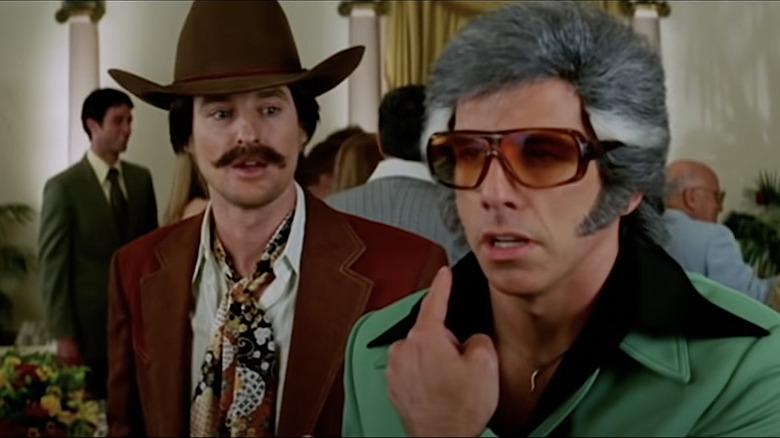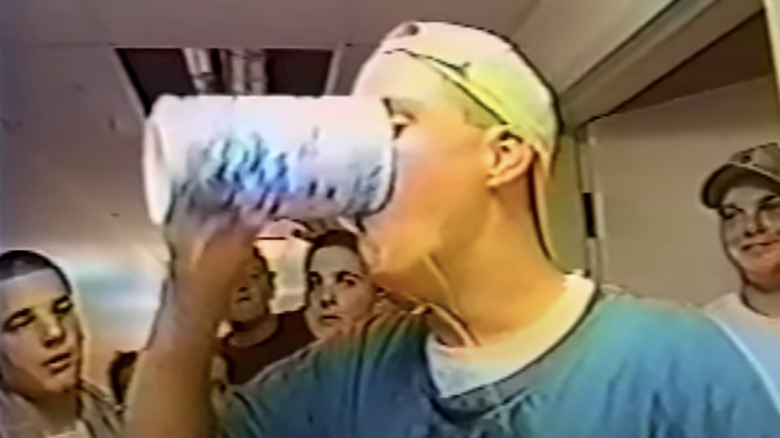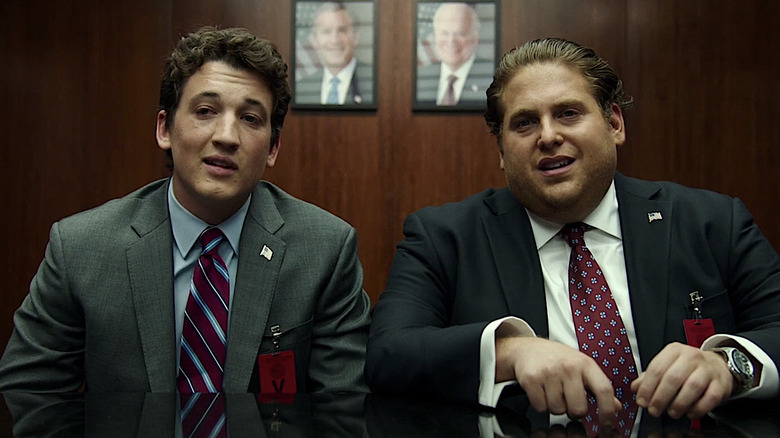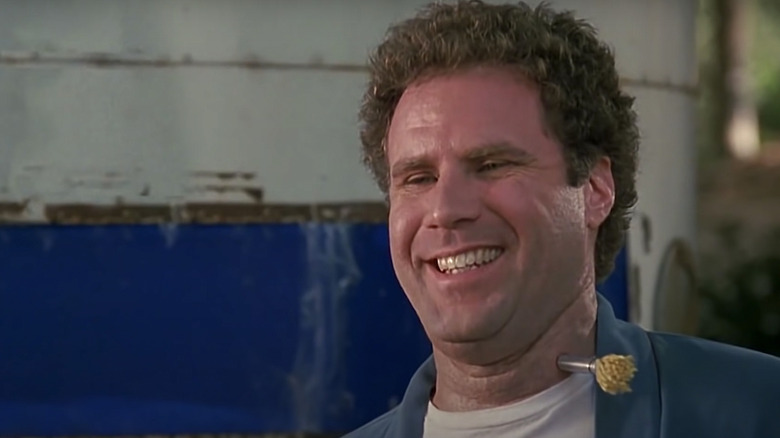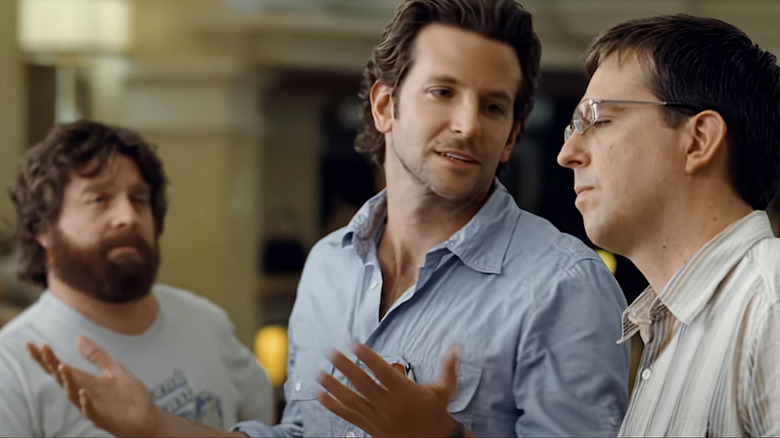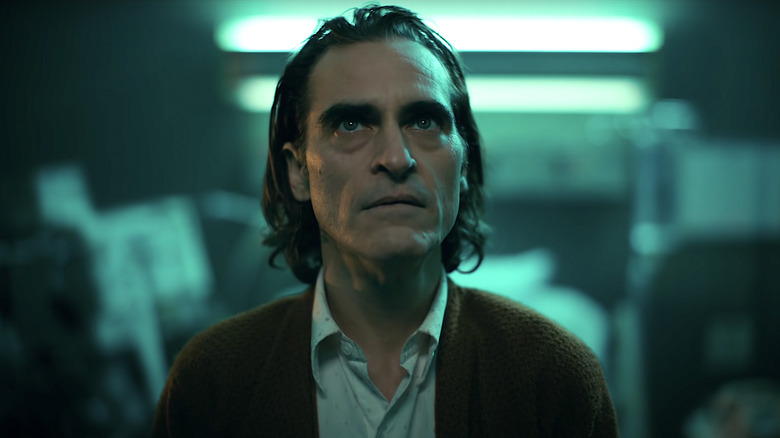Every Todd Phillips Movie Ranked Worst To Best
Now for the curious case of Todd Phillips. After directing some of the funniest comedies of the 21st century with "Old School" and "The Hangover" trilogy, his career looked a lot like his fellow "frat pack" friends Judd Apatow ("The 40-Year Old Virgin) and Adam Mckay ("Anchorman"). That was before his pivot to making one of the best dramas of the millennium with "Joker" in 2019. Maybe the old Hollywood maxim that comedy is the toughest genre is true. If you can make people laugh, making them cry is easy.
The Bronx-born Phillips was a film school dropout but pursued the life of a documentarian. In the '90s he appeared as one of those prodding producer-drivers on HBO's "Taxi Cab Confessional," but his real work was on a series of underground docs about male depravity. However, Phillips made his bones in Hollywood as a screenwriter. Ivan Reitman of "Ghostbusters" fame discovered Phillips and gave him this big break. Phillips had his hands on "Borat" and then punched his own ticket with the scripts for "Road Trip" and "Old School." Billions in box office revenue followed. Phillips has been on fire for decades, but when he made his pivot to more serious cinema, it was ironically a movie about a failed comic. What on Earth would Todd Phillips know about failure? Not much, but we're still going to rank his movies from worst to best.
13. School for Scoundrels
Jon Heder of "Napoleon Dynamite" fame plays Roger, a lovelorn loser whose felicity with the fairer sex leaves a lot to be desired. As he tries to charm his crush, Amanda (Jacinda Barrett), his come-ons are so clunky that her best friend, a saucy Sarah Silverman, brands him a stalker.
To turn it around Roger enrolls in a confidence course taught by Dr. P (Billy Bob Thorton, rehashing his vulgar "Bad Santa" schtick). Dr. P's pedagogy mostly involves insults and cruelty, so when it turns out this pugilistic professor is also pursuing Amanda, master and pupil go to war. "School for Scoundrels" is a remake of the 1960 comedy starring Ian Carmichael and Alistair Sim, but ToddPhillips penned the updated screenplay. It's definitely on brand as another of his signature studies of male energy. Thornton is toxic, and Heder is the hapless nice guy Hollywood likes to drag across the finish line.
The only problem is that none of this is funny. "School for Scoundrels" is Phillips' first real flop with both fans and critics and also his first box office bomb, failing to make back its hefty $35 million price budget.
12. Due Date
Following "The Hangover," audiences wanted more of the eccentricity of Zach Galifianakis. Released in 2010, "Due Date" is sort of Warner Brothers' effort to unofficially remake "Trains, Plains, and Automobiles," with Galifianakis in the John Candy role and Robert Downey Jr. as the exasperated Steve Martin-style character, Peter Highman. Peter is about to have his first child but misses his flight because of interference from part-time actor and full-time idiot Ethan Tremblay (Galifianakis). From there it's a road movie, and hijinks ensue.
Galifianakis and Downey's star power carried this film to a tidy profit in theaters, but it doesn't work. Neither critics nor audiences liked it. Downey is great as always as an exasperated straight man, but coming off "Iron Man," he's best in the wise-cracking driver's seat. Yet, Galifianakis as Tremblay is such a revolting doofus that he will wear on your nerves.
Danny McBride makes a great cameo as an impatient Western Union employee eager to get to his dinner reservation at Chili's. McBride was like a skeleton key for comedies in this era. Comedy directors could just plug him into their movie in any role — no matter how minor — and he'd steal a scene or two.
11. Road Trip
The road movie is a venerable tradition. With his 2000 feature debut, "Road Trip" Todd Phillips penned a lurid 1980s-style sex romp. Informed by Philips' first-hand experience inside the debauchery of fraternity culture in his award-winning documentary "Frat House," it's a wacky adventure featuring the off-beat tomfoolery of Tom Green and the meathead bravado of Sean William Scott, fresh off his star turn as Stiffler in "American Pie."
When Josh (Breckin Meyer) nervously agrees to film a college hookup, the video somehow gets mailed to his girlfriend in Texas. He and a group of friends pack up in an RV for a mad cross-country dash to intercept the tape. Not everything in this raunchy film would fly today, but in 2000, the modestly budgeted comedy raked in nearly $120 million worldwide. This success is one of the reasons Phillips was able to make so many subsequent and more substantive movies in the two decades that followed. Comedy doesn't age like wine, so "Road Trip" is hard to recommend, but it was definitely an amusing ride in its time.
10. Bittersweet Motel
Documentary filmmakers and jam bands have something big in common: Both approach their craft with an established set of tools, but there is no script. Each finds the story along the way.
Released in 1997, "Bittersweet Motel" about the notable jam band Phish is the second music documentary of Todd Phillips' early career. Phish is maybe the second biggest name in chilled-out and loosely organized psychedelic song-craft after The Grateful Dead (Phish fans sometimes loathe the comparison).
"They don't know what's going to happen, just like we don't know what's going to happen," remarks bassist Mike Gordon, referring to his fans showing up for the band's ever-changing setlist. This isn't a group that ever had radio hits. They built their cult following on tour from the ground up. And it is a literal following, as their fans travel with the band. Phillips himself followed the band for two years, capturing backstage stuff and the humble musings of the group's reluctant leader and virtuoso guitarist, Trey Anastasio. This doc mostly has the underground feel of Phillips' first two films, and given the trail mix and sandals mentality of these genial rockers, it works.
9. Hated: GG Allin & the Murder Junkies
G.G. Allin was an underground punk rocker and performance artist who once did a three-year prison stretch for putting his cigarette out on a woman and then throwing her across a table. His onstage antics included knocking out his teeth, defecating, and coprophagy. His ultimate plan was to kill himself during a performance. He wasn't a musician, not really. He didn't sing. He more or less just screamed at his audience in an act that was the ultimate expression of punk nihilism.
A young Todd Phillips was something of a scene kid while growing up in New York, he explained to Stefanie Heminger. He started up a correspondence with Allin during one of the rocker's many prison stints. When Allin was released, Phillips sent him a bus ticket, and Allin broke parole to shoot the director's first project in 1993. Disturbingly, Phillips financed all this by selling posters for the movie with art by serial killer John Wayne Gacy. Gacy and Allin were friends, and the filmmaker knew the novelty could raise the cash he needed.
Allin died of a heroin overdose shortly after the shoot wrapped and some of the funeral footage is added after the credits. Overall, the movie has the quality of home video. It's graphic and disgusting, but in retrospect, it feels like a suitable first project for a man whose eventual masterpiece would be about a similarly unhinged character in "Joker."
8. The Hangover Part III
"You hear that Mr. Anderson? That is the sound of inevitability." That scene of Agent Smith (Hugo Weaving) talking to Neo (Keanu Reeves) in "The Matrix" is probably a little what Warner Brothers sounded like pressing Todd Phillips and company to turn "The Hangover" into a trilogy after the record-shattering returns of the first two films.
Phillips' approach to pulling this off again was to lock himself in a room with screenwriter Craig Mazin as the two just tried to make each other laugh. He also relied on feedback from star Zach Galifianakis. "There's nothing better than when Zach texts me and says, 'I read that scene. Dying,'" Phillips told Vanity Fair. And this film does put the focus on Galifianakis' man-child, Alan. He's off his meds and more obnoxious than ever, but when The Wolfpack does an intervention and tries to get him to an in-patient clinic, another wacky road trip ensues.
Some in the press were hard on the second installment. After all, how could the same thing happen to these guys twice? Comedy follows a rule of threes, so Phillips' response was to triple down. "We were like, 'Oh yeah? It's going to happen three times.'" Critics responded in kind, and "The Hangover Part III" has the worst Rotten Tomatoes score of Phillips' career. Maybe this series didn't finish strong, but it still made a bucket of money — over $362 million globally.
7. The Hangover Part II
In "The Hangover Part II," it's Stu (Ed Helms) who is getting married. Leery of repeating the events of Doug's (Justin Bartha) bachelor's trip to Las Vegas, he plans a non-alcoholic rehearsal brunch for his wedding in Thailand. The next thing he knows, he wakes up in Bangkok with a Mike Tyson-style face tattoo, and The Wolfpack is doing the amnesia plot all over again.
Phillips got a staggering $80 million budget to get the band back together for this sequel to the then biggest R-rated comedy ever. The box office receipts beat the first film, grossing nearly $500 million. The director had another cash cow, but without the currency of the original. "The Hangover Part 2" is dirtier and darker, and the cast is certainly game, but it doesn't have the same heart. It seems a bit sinister, as Alan (Zach Galifianakis) once again drugs his friends, this time with muscle relaxers and his ADHD meds in the marshmallows when he and the boys enjoy a bonfire. The absurdity of this repetition is part of the joke, and the movie is full of self-awareness, but being meta isn't the same as being funny.
6. Starsky & Hutch
Todd Phillips grew up in a house with his mother and two older sisters, and there were no fraternities at New York University, where he briefly went to film school. Despite the assumptions about him, he says he's not like any of his bawdy characters. As he said at SXSW, he was "never really exposed to a lot of male relationships," but always found them awkward and fascinating.
That definitely translates to the 2004 buddy cop comedy "Starsky & Hutch." Phillips also says he's drawn to comedies that feel "grounded" in the real world as is the case with "Stripes" (one of the director's favorites) rather than the more out-there antics of films like "Austin Powers." "Starsky & Hutch" is goofy, but it's also a police procedural that walks the line between these two modes. Owen Wilson and Ben Stiller play the titular cops who want to take down a menacing drug kingpin, played with tremendous verve by Vince Vaughn at his tempestuous best.
The critical reception wasn't exactly ecstatic, but the $170 million box office was decent. Once again, Phillips was in the comedic catbird seat. Stiller's uptight Starsky contrasts nicely with Wilson's laid-back Hutch, and this movie stands as a time capsule of two of the funniest and most charming Hollywood performers ever doing exactly what they do best.
5. Frat House
Todd Phillips made "Frat House" for HBO in 1998, capturing the excesses of fraternity life. Fraternities are a little like "Fight Club." The rituals, hazing, and hard partying are only supposed to be fully known to insiders.
This controversial film didn't initially see the light of day because the subjects claimed they were "drunk and stoned" when they signed releases, which was true, Phillips admitted to Howard Stern. Phillips narrates the debauchery with the dry delivery of droll comedian Steven Wright. It's total commitment when he stoically endures a degrading hazing ritual in which he's locked in a dog cage and covered in "beer, ash, and tobacco spit."
Phillips' goal was to make a documentary version of "Animal House," and to that end, he succeeds. It's all the worst of fraternity life, but the director doesn't shy from the allegation he manipulated his subjects. The camera alone does that, he explained to The Off Camera Show. Phillips says directing is manipulation and that the idea of objective, "fly-on-the-wall filmmaking" is a false premise that was dead by the time he made this film. Everyone in 1998 knew a camera could change your life, and of course, it also tends to change what happens in real-time as subjects lean into performative versions of themselves. That said, as a survivor of fraternity life myself, nothing in this documentary is beyond belief, and accordingly, Phillips won the Grand Jury Prize at Sundance.
4. War Dogs
"War Dogs," a funny but often deadly serious film about two reckless war profiteers marks Todd Phillips' transition away from fratty comedies. Adapted from a true story first published in Rolling Stone, the director had a new challenge. "This is definitely a trickier tone than what I've done before because of that balance with the comedy and the drama," he told The Off Camera Show.
Both aspects work thanks to phenomenal turns from Jonah Hill and Miles Teller as two childhood friends who find a clever and amoral way to get rich quickly. They act as a third party, selling arms in various global hot spots where the US government won't deal directly. They love the high life, but when they land a $300 million contract to supply weapons to Afghan troops, they begin to crack under the pressure.
Like "The Wolf Of Wall Street," "War Dogs" is a rise and fall story about two young men undone by greed, but really, these merchants of mayhem are part of a much bigger game. "There is an underbelly to [the United States military] where a lot of people make a lot of money," Phillips told The Movie Times, "and these are two guys that try to get in on that."
3. Old School
In 2003, Todd Phillips followed up his first feature, "Road Trip," with a more venerable comedy classic in "Old School." When Mitch (Luke Wilson) finds out his girlfriend has been cheating, he moves into a house near a college campus to pick up the pieces. That's when his best buds, aging family men Frank (Will Ferrell) and Beanie (Vince Vaughn) decide to turn Luke's bachelor pad into an all-ages fraternity. This pits them against Jeremy Piven's very peeved Dean Gordon "Cheese" Pritchard.
As Frank "The Tank" would say, "Old School" is just so good when it hits your lips. This is the film that really inducted Phillips into the "frat pack" with fellow elite directors Wes Anderson, Judd Apatow, and Adam Mckay. That's not just a clever moniker. Phillips followed his intuition that masculine bonding is inherently funny. "That's the thing I keep going back to, men's relationship with each other," the director told Aint It Cool News. "There's such an awkwardness to it, and it lends itself so well to comedy, just how men relate to each other in general ... It's also about focusing on the various inadequacies of men." "Old School" is one of the most lovable entries in the popular aughts man-child comedy genre.
2. The Hangover
Coming off the down note of his first bomb, "School For Scoundrels," in 2005, Todd Phillips bounced back with the highest-grossing R-rated comedy of all time. "The Hangover" made nearly half a billion dollars globally and turned the once obscure piano-playing, alt-scene-comic Zach Galifianakis into a household name. And it's hilarious for 100 straight minutes — all while being shot with the slickness of a big-budget action movie.
You know the story: Four guys go to Las Vegas for a bachelor party but get so wasted they lose the groom and spend the entire next day piecing together what happened. Phillips didn't write the script, but he was the right man to direct the boys-will-be-boys debauchery.
Mike Tyson, of course, makes a great cameo as a kind of Nevada kingpin version of himself. The Wolfpack, as these guys call themselves, has a run-in with the former champ and his tigers during their wild night. Phillips recalls how funny the former fighter was on set. During the scene in which Tyson knocks out Galifianakis' character, he kept pulling the punch, and it didn't look right on camera. Finally, Phillips had to come over and show the boxer how it's done. Phillips recalled Tyson's reaction to the irony to James Corden, "Oh, this is great," Tyson joked, "I'm getting boxing lessons from the captain of the Jewish debate team."
1. Joker
Todd Phillips is a great director because he understands the assignment. Filmmaking is not about depth of field or lenses but rather being a "purveyor of tone," he explained to Vanity Fair of this foray into the DC universe with "Joker" in 2019. "The thing I'm most proud of in this film is that unsettling tone, that sort of slow ramp up into insanity."
Phillips' "Joker" is a reimagining of Batman's maniacal arch nemesis as a severely mentally ill man who has fallen through the cracks of Gotham's crumbling public service sector. Phillips' script takes the Christopher Nolan impulse to make the universe gritty and realistic even further by giving real-world explanations for everything, including the character's famously unhinged laugh, which here is the result of brain trauma. Stress induces the cackling. It is the perfect explanation for the clown prince of crime, who has always been laughing on the outside but crying on the inside.
Phillips' focus on the tone makes "Joker" a great film but so does his script, which doesn't distract the audience with endless cross-cutting like so many superhero pictures. The camera stays with Joaquin Phoenix's Arthur Fleck in this origin story as he unravels. "Joker" is so grounded that it works with minimal Batman connection. "Joker" is also a technical and visual achievement, featuring one of the most pleasing orange and teal color palettes in cinema history, perfectly matching the character's classic aesthetic.
